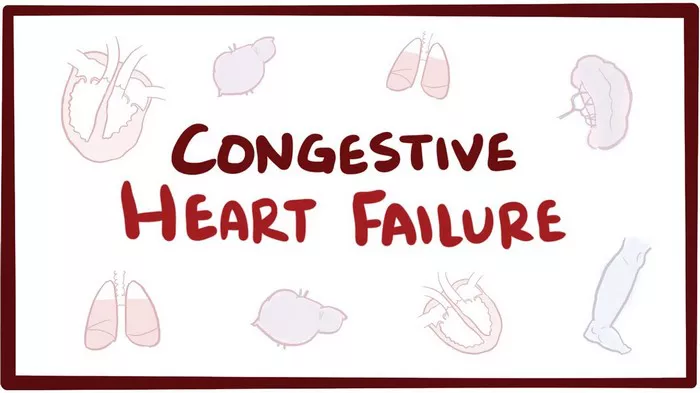Congestive Heart Failure (CHF) is a chronic condition where the heart’s ability to pump blood is inadequate to meet the body’s needs. An exacerbation of CHF, or a worsening of symptoms, can significantly impact a patient’s quality of life and may necessitate immediate medical intervention. Recognizing the signs of CHF exacerbation is crucial for timely treatment and improved outcomes.
Shortness of Breath
One of the most common signs of CHF exacerbation is shortness of breath, also known as dyspnea. This can occur during physical activity, while lying down (orthopnea), or even at rest. Patients may experience paroxysmal nocturnal dyspnea (PND), which is sudden nighttime shortness of breath that can wake them from sleep. The underlying cause is fluid buildup in the lungs, a condition known as pulmonary congestion, which hampers efficient gas exchange and leads to difficulty breathing.
Fatigue And Weakness
As the heart struggles to pump blood effectively, muscles and other tissues receive less oxygen-rich blood, leading to increased fatigue and generalized weakness. This can make everyday activities such as walking, climbing stairs, or carrying groceries feel exhausting. Patients might also experience difficulty in concentrating and a reduced ability to perform mental tasks.
Edema
Fluid retention, or edema, is a hallmark sign of CHF exacerbation. This often manifests as swelling in the legs, ankles, and feet due to the gravitational pull and the body’s struggle to circulate blood effectively. Edema can also occur in the abdomen, causing bloating and discomfort. Severe cases may lead to ascites, where fluid accumulates in the abdominal cavity.
Rapid Weight Gain
Sudden weight gain can be an indicator of fluid retention and worsening heart failure. A weight gain of more than 2-3 pounds in a day or 5 pounds in a week should be a red flag. This weight gain is typically due to fluid accumulation rather than an increase in body fat.
Persistent Cough or Wheezing
A persistent cough, especially one that produces white or pink frothy sputum, can signal a CHF exacerbation. This type of cough is often caused by fluid buildup in the lungs. Wheezing, or a whistling sound during breathing, can also occur due to the same reason.
Increased Heart Rate
Tachycardia, or a rapid heart rate, is another sign of CHF exacerbation. As the heart struggles to pump enough blood, it may compensate by beating faster. This increased workload can further weaken the heart over time.
Decreased Exercise Tolerance
Patients with worsening CHF may notice a significant reduction in their ability to tolerate exercise. Activities that were previously manageable may become difficult or impossible. This decreased tolerance is often due to both reduced cardiac output and increased fatigue.
Abdominal Symptoms
Patients may experience abdominal symptoms such as nausea, lack of appetite, and fullness. This is often due to fluid buildup in the liver and gastrointestinal tract, which can impair digestion and cause discomfort.
Dizziness And Lightheadedness
Reduced blood flow to the brain can cause symptoms of dizziness, lightheadedness, and even fainting (syncope). These symptoms are particularly concerning as they may increase the risk of falls and related injuries.
Cyanosis
Cyanosis, a bluish tint to the skin, lips, or fingernails, can occur due to inadequate oxygenation of the blood. This sign indicates severe heart failure and requires immediate medical attention.
Chest Pain
While not as common as other symptoms, chest pain or angina can occur in patients with CHF exacerbation. This is often due to the heart working harder to pump blood, leading to increased oxygen demand and potential ischemia.
Changes in Urination Patterns
Patients may notice a decrease in urine output during the day and an increase in nighttime urination (nocturia). This is due to fluid being mobilized and filtered by the kidneys when lying down.
Cold And Clammy Skin
A compromised cardiac output can lead to reduced perfusion of the skin, causing it to feel cold and clammy. This is a sign that the body is diverting blood flow to essential organs.
Identifying And Managing CHF Exacerbation
Timely identification of CHF exacerbation is critical for managing the condition and preventing further deterioration.
Patients and caregivers should be educated about the signs and symptoms to watch for and the importance of prompt medical evaluation.
Regular Monitoring
Patients with CHF should regularly monitor their weight, blood pressure, and heart rate. Keeping a daily log can help detect early signs of exacerbation. Sudden changes should be reported to a healthcare provider immediately.
Medication Adherence
Adhering to prescribed medications is crucial for managing CHF. These may include diuretics to reduce fluid buildup, ACE inhibitors or ARBs to relax blood vessels, beta-blockers to reduce heart rate, and other medications as determined by the healthcare provider.
Diet And Lifestyle
Modifications
Patients should follow a heart-healthy diet, low in sodium and rich in fruits, vegetables, and whole grains. Limiting fluid intake may also be necessary to prevent fluid overload. Regular, moderate exercise as tolerated is beneficial, but patients should avoid overexertion.
Advanced Therapies
In cases where standard treatments are insufficient, advanced therapies such as cardiac resynchronization therapy (CRT), implantable cardioverter-defibrillators (ICDs), or even heart transplantation may be considered.
Conclusion
Understanding and recognizing the signs of CHF exacerbation is vital for patients, caregivers, and healthcare providers.
Early detection and management can significantly improve patient outcomes and quality of life. By adhering to treatment plans, making lifestyle modifications, and staying vigilant for signs of exacerbation, patients with CHF can better manage their condition and reduce the risk of severe complications.

